Serving 445 students in grades Prekindergarten-5, Bardmoor Elementary School ranks in the bottom 50% of all schools in Florida for overall test scores (math proficiency is bottom 50%, and reading proficiency is bottom 50%).
The percentage of students achieving proficiency in math is 45-49% (which is lower than the Florida state average of 52%). The percentage of students achieving proficiency in reading/language arts is 40-44% (which is lower than the Florida state average of 52%).
The student:teacher ratio of 15:1 is lower than the Florida state level of 17:1.
Minority enrollment is 46% of the student body (majority Hispanic), which is lower than the Florida state average of 65% (majority Hispanic).
Quick Stats (2025)
- Grades: Prekindergarten-5
- Enrollment: 445 students
- Student:Teacher Ratio: 15:1
- Minority Enrollment: 46%
- Overall Testing Rank: Bottom 50% in FL
- Math Proficiency: 45-49% (Btm 50%)
- Reading Proficiency: 40-44% (Btm 50%)
- Science Proficiency: 40-49% (Btm 50%)
- Source: National Center for Education Statistics (NCES), FL Dept. of Education
Top Rankings
Bardmoor Elementary School ranks among the top 20% of public schools in Florida for:
Category
Attribute
Student Attention
School Overview
Bardmoor Elementary School's student population of 445 students has declined by 10% over five school years.
The teacher population of 30 teachers has declined by 21% over five school years.
Grades Offered
Grades Prekindergarten-5
Total Students
445 students
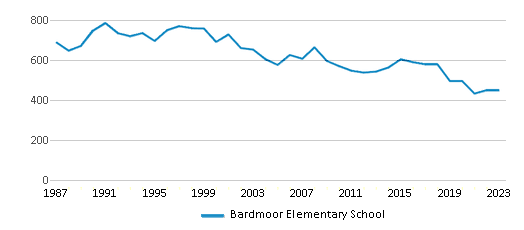
Gender %
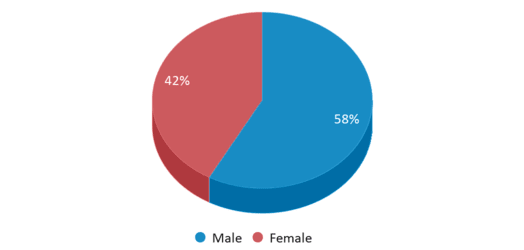
Total Classroom Teachers
30 teachers
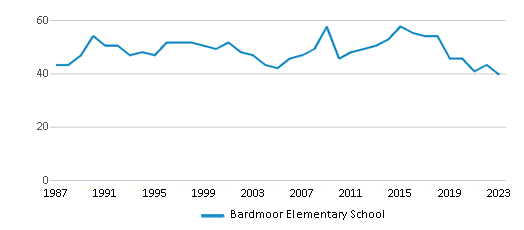
Students by Grade
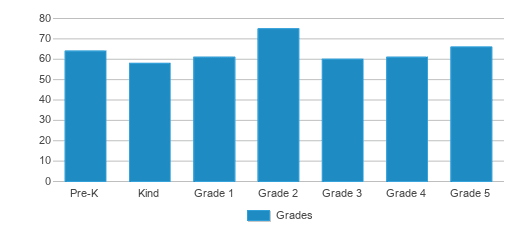
School Rankings
Bardmoor Elementary School ranks within the bottom 50% of all 3,704 schools in Florida (based off of combined math and reading proficiency testing data).
The diversity score of Bardmoor Elementary School is 0.64, which is less than the diversity score at state average of 0.70. The school's diversity has stayed relatively flat over five school years.
Overall Testing Rank
#2271 out of 3704 schools
(Bottom 50%)
(Bottom 50%)
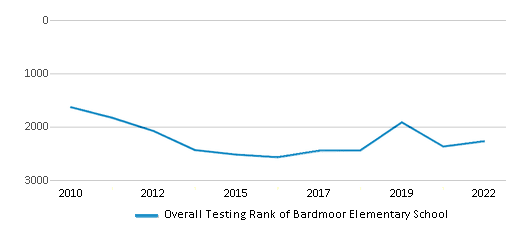
Math Test Scores (% Proficient)
45-49%
52%
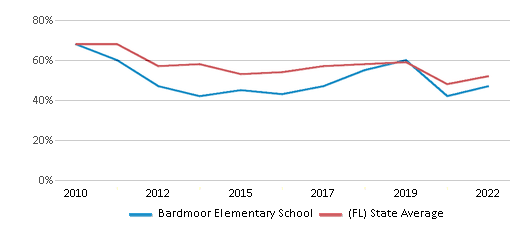
Reading/Language Arts Test Scores (% Proficient)
40-44%
52%
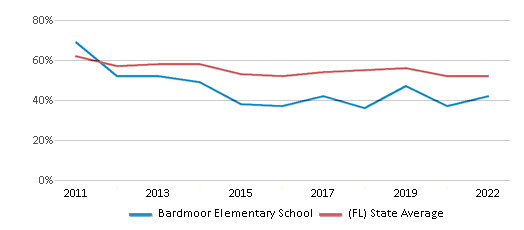
Science Test Scores (% Proficient)
40-49%
52%
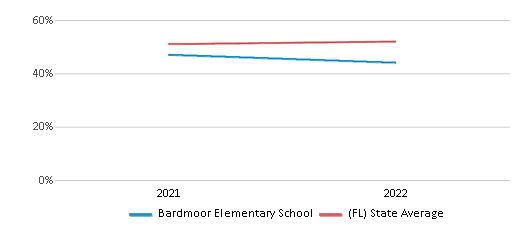
Student : Teacher Ratio
15:1
17:1
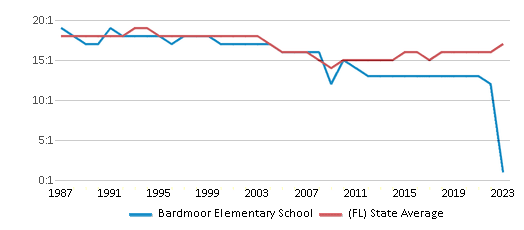
American Indian
1%
n/a
Asian
5%
3%
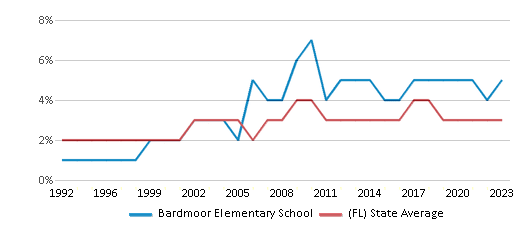
Hispanic
23%
37%
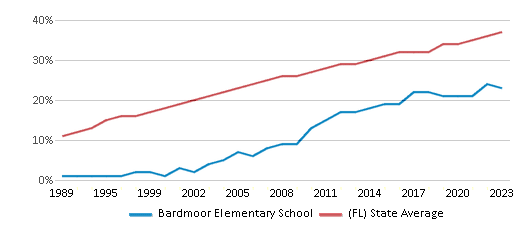
Black
9%
21%
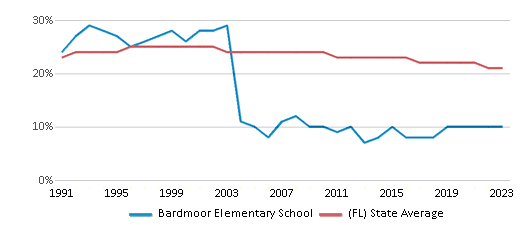
White
54%
35%
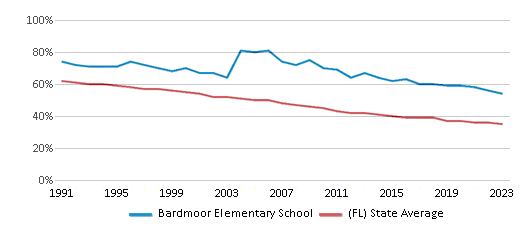
Hawaiian
n/a
n/a
Two or more races
8%
4%
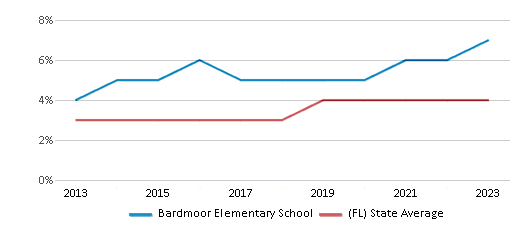
All Ethnic Groups
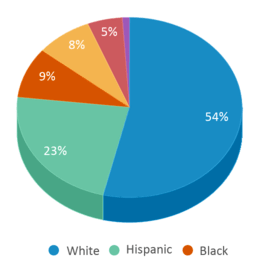
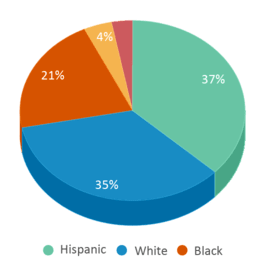

Participates in the National School Lunch Program (NSLP)
Yes
Eligible for Free Lunch
54%
47%
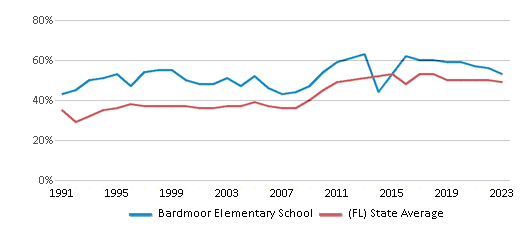
Eligible for Reduced Lunch
7%
4%
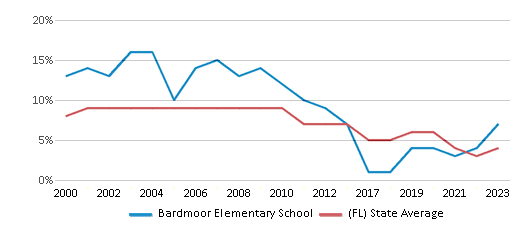
School Statewide Testing
School District Name
Source: National Center for Education Statistics (NCES), FL Dept. of Education
School Notes
- Gulf High School is a four-year public high school in New Port Richey, Florida. It is part of the Pasco County Schools in Pasco County, Florida. Gulf High School opened its doors in 1922.
- History: Gulf High School opened on September 18, 1922, with an initial enrollment of 39 students and a faculty consisting of three teachers. There were no seniors during the first school year; the first graduation took place on April 29, 1924, with eleven seniors. Although Gulf High School remained the only high school in western Pasco County for over fifty years, enrollment remained small through the 1950s and local residents feared the state might close the school. In the 1920s and 1930s the sports teams were nicknamed the "Cooties," from a shortened name for the Pithlachascotee River, on which the school was situated. In 1931 a dispute between the school trustees and the county school board over the selection of a principal was appealed to the Florida Supreme Court. In 1938 football was revived after an absence of several years and in November of that year the Tampa Tribune dubbed the team the "losingest team in the country," as it had been outscored by 442-0 thus far in the season. But the 1941-42 football team had a 9-1 record and won the Gulf Coast Conference championship. In 1961 Gulf High School moved into a new building, and in 1977 it moved to its third and current location. The building which now houses Gulf High school opened as Gulf Junior High School in 1971; in 1977 the two schools switched buildings. Schools in Pasco County were racially integrated in the 1960s, and the first black students to attend Gulf High School were enrolled at the start of the 1966-67 school year.
- Institute of Health and Human Services: The focus of the IHHS, which was founded in 1996, is to facilitate students who aspire to pursue careers in health related fields or other human services. This learning community is heavily affiliated with the national student organization HOSA (Health Occupations Students of America), which lends a competitive aspect to the learning process. Especially later in the program, there is a very hands on approach to discovering where a student may best fit in the world of health and human services.
- Institute of Communications and the Arts: The focus of this learning community is in part, the fine arts and the appreciation thereof. Gulf High School has a very well developed fine arts program, with courses in photography, art, chorus, drama and several bands.
- Institute of Business and Technology; Institute of Technical Services; Program for Identifying Baccalaureate Studies.
Frequently Asked Questions
What is Bardmoor Elementary School's ranking?
Bardmoor Elementary School is ranked #2271 out of 3,704 schools, which ranks it among the bottom 50% of public schools in Florida.
What schools are Bardmoor Elementary School often compared to?
Bardmoor Elementary Schoolis often viewed alongside schools like Starkey Elementary School, Bauder Elementary School by visitors of our site.
What percent of students have achieved state testing proficiency in math and reading?
45-49% of students have achieved math proficiency (compared to the 52% FL state average), while 40-44% of students have achieved reading proficiency (compared to the 52% FL state average).
How many students attend Bardmoor Elementary School?
445 students attend Bardmoor Elementary School.
What is the racial composition of the student body?
54% of Bardmoor Elementary School students are White, 23% of students are Hispanic, 9% of students are Black, 8% of students are Two or more races, 5% of students are Asian, and 1% of students are American Indian.
What is the student:teacher ratio of Bardmoor Elementary School?
Bardmoor Elementary School has a student ration of 15:1, which is lower than the Florida state average of 17:1.
What grades does Bardmoor Elementary School offer ?
Bardmoor Elementary School offers enrollment in grades Prekindergarten-5
What school district is Bardmoor Elementary School part of?
Bardmoor Elementary School is part of Pinellas School District.
School Calendar
View the Bardmoor Elementary School yearly calendar below. Note key dates such as:
Event
Date
The last day for all students has changed from an early-release day to a full day.
May 29, 2025 (Thursday)
School Reviews
Review Bardmoor Elementary School. Reviews should be a few sentences in length. Please include any comments on:
- Quality of academic programs, teachers, and facilities
- Availability of music, art, sports and other extracurricular activities
Recent Articles

What Is A Charter School?
Explore the world of charter schools in this comprehensive guide. Learn about their history, how they operate, and the pros and cons of this educational innovation. Discover key facts about charter schools, including admission policies, demographics, and funding, as well as what to look for when considering a charter school for your child.

10 Reasons Why High School Sports Benefit Students
Discover the 10 compelling reasons why high school sports are beneficial for students. This comprehensive article explores how athletics enhance academic performance, foster personal growth, and develop crucial life skills. From improved fitness and time management to leadership development and community representation, learn why participating in high school sports can be a game-changer for students' overall success and well-being.

February 05, 2025
Understanding the U.S. Department of Education: Structure, Impact, and EvolutionWe explore how the Department of Education shapes American education, from its cabinet-level leadership to its impact on millions of students, written for general audiences seeking clarity on this vital institution.





